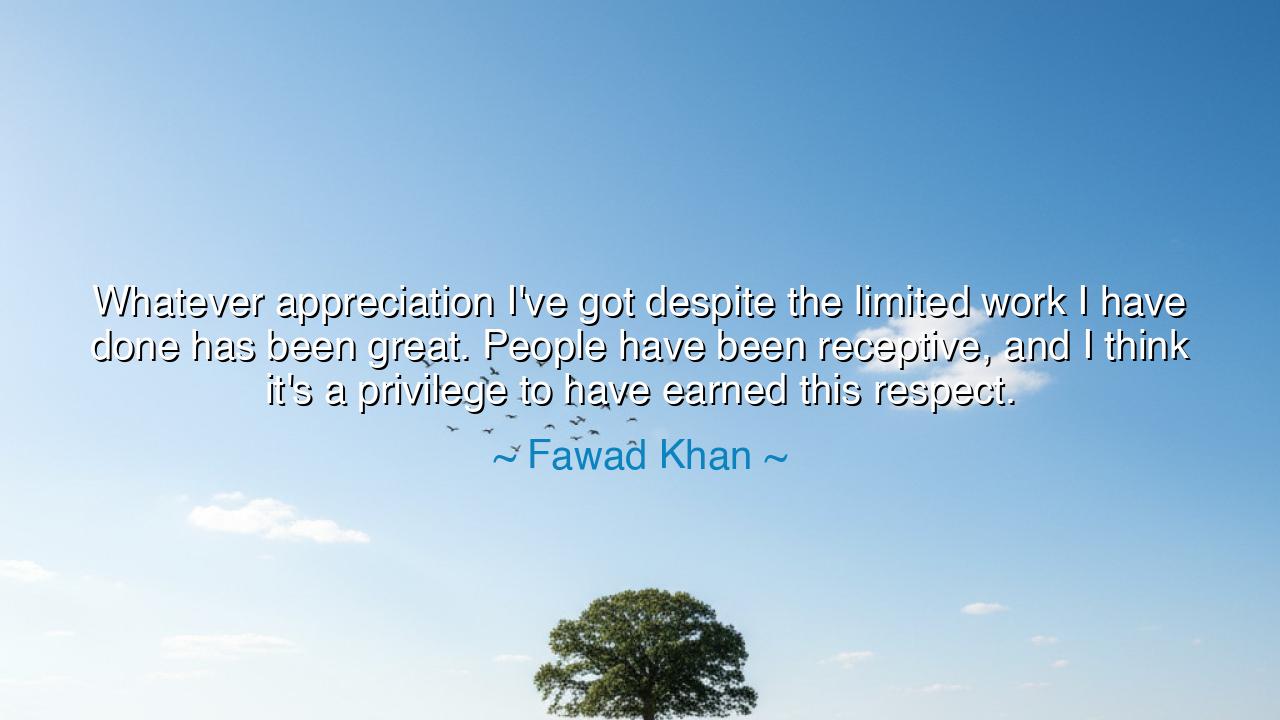
Whatever appreciation I've got despite the limited work I have
Whatever appreciation I've got despite the limited work I have done has been great. People have been receptive, and I think it's a privilege to have earned this respect.






In the course of a life well-lived, there are few honors as enduring as the respect of one’s peers. Fawad Khan, with his humble reflection, states, "Whatever appreciation I've got despite the limited work I have done has been great. People have been receptive, and I think it's a privilege to have earned this respect." These words speak to a profound truth that transcends time: that true honor is not found in vast accomplishments, but in the quiet acknowledgment of others, the respect earned through integrity, humility, and commitment.
In the ancient world, respect was considered the most coveted of all rewards. The Greek philosopher Aristotle taught that the highest form of honor is not bestowed through titles or material gain, but through the recognition of one’s character and contributions to society. Just as Achilles was revered not only for his bravery but for the honor he carried within himself, so too does Fawad Khan recognize that his respect was not simply given, but earned through his consistent actions and dedication. It is the quality of a person's spirit, rather than the quantity of their deeds, that ultimately shapes the legacy they leave behind.
In the story of Socrates, we see a striking example of this kind of earned respect. Socrates did not amass a fortune or accumulate material wealth; he spent his days questioning and challenging the very foundations of society’s beliefs. Yet, it was through his humility and commitment to truth that he earned the respect of his followers and the admiration of those who opposed him. Even in his death, Socrates’ respect endured, as the very principles he lived by continued to shape philosophy and thought for generations to come. His legacy teaches us that true respect is a natural outgrowth of living a life of integrity—a lesson that resonates with the humility expressed by Khan.
Fawad Khan's reflection also speaks to the deeper meaning of appreciation. In a world driven by fame, power, and recognition, it is easy to overlook the quiet gratitude that arises from a life lived authentically. Khan’s appreciation for the respect he has earned, despite the “limited work” he feels he has done, reminds us that it is not the magnitude of one's achievements that bring true contentment, but the genuine appreciation of others. He humbly acknowledges that he has been blessed to have earned this respect, a reflection of the gratitude he feels for those who have recognized his contributions, however modest they may be.
Consider the example of Marcus Aurelius, the Roman Emperor and Stoic philosopher, who often reflected on the fleeting nature of fame and recognition. In his Meditations, he wrote about the importance of acting with virtue and integrity for the sake of the greater good, not for the applause or admiration of others. Even as a ruler, Marcus Aurelius sought not the validation of his actions, but the fulfillment of his moral duty. Yet, despite his detached approach to fame, his leadership was marked by a deep respect from his people, earned not through grandiose displays but through his unwavering commitment to the common good.
The lesson from Fawad Khan’s words is profound: that the true measure of one’s life is not in how much attention or recognition one receives, but in the respect one earns by remaining true to oneself. As we live our lives, let us not seek validation through fame or the pursuit of external approval, but through authenticity, humility, and the courage to live in alignment with our values. It is through this quiet yet powerful integrity that respect will naturally follow, just as the mighty oak tree grows from a small, humble seed.
In our daily lives, let us strive to earn the respect of those around us by acting with honor and integrity, regardless of the size of our achievements. Whether in our work, our relationships, or our communities, let us focus not on the applause or recognition we may receive, but on the quiet satisfaction that comes from knowing we have lived true to our highest selves. In this way, we shall build a legacy that outlasts the fleeting nature of fame and leaves behind a lasting respect that will endure for generations.






AAdministratorAdministrator
Welcome, honored guests. Please leave a comment, we will respond soon